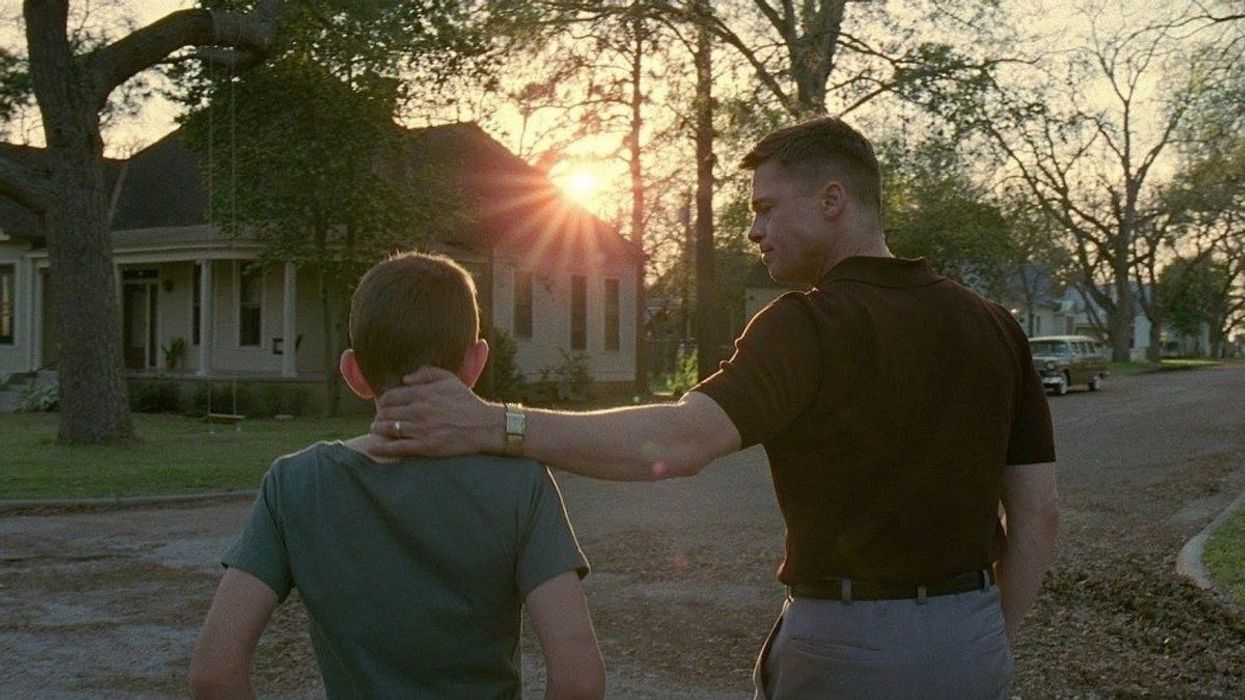It's Been 10 Years Since 'The Tree of Life' Debuted: Nature or Grace?
Are you taking the path of nature or grace?

The Tree of Life premiered in competition at the 2011 Cannes Film Festival, where it was awarded the Palme d'Or. Everyone was buzzing about the new Terrence Malick film that tracked the history of humanity juxtaposed against the life of a human being.
This experimental drama starred famous faces like Brad Pitt, Sean Penn, and Jessica Chastain doing very unfamiliar things. They were talking quietly, speaking in almost riddles, and had to share screentime with planets and dinosaurs.
The movie was driven by a powerful voiceover that asks us a question: should we follow the way of nature or the way of grace?
The Tree of Life ranked number one on review aggregator Metacritic's "Top Ten List of 2011," and made more critics' year-end lists for 2011 than any other film.
But what does The Tree of Life look and feel like 10 years later?
Nature and Grace
We revisited this film for our best films of the decade, and we weren't alone. Hundreds of other publications called it the best film in the last 10 years, and it's certainly one of the most talked about. At the time, people were going in droves—and walking out as well, upset by the non-narrative format and lack of a Hollywood story. It was a breakout experimental hit.
It's a movie you think about forever.
Roger Ebert gave the film four stars of four and wrote:
"The Tree of Life is a film of vast ambition and deep humility, attempting no less than to encompass all of existence and view it through the prism of a few infinitesimal lives. The only other film I've seen with this boldness of vision is Kubrick's 2001: A Space Odyssey and it lacked Malick's fierce evocation of human feeling. There were once several directors who yearned to make no less than a masterpiece, but now there are only a few. Malick has stayed true to that hope ever since his first feature in 1973."
The film begins with a quotation from the Book of Job 38:4-7: "Where were you when I laid the foundations of the Earth? ... When the morning stars sang together, and all the sons of God shouted for joy?"
Thi movie is about wrestling with God (grace) and the natural cycle of life and death. It questions not only our position and impact but also the very nature of a soul's worth to the people who interact with it.
The following story is of a man remembering his family as he also contemplates the creation and evolution of the world. We follow this journey through life and eventually through death. We see the people he left behind and see a world full of hope, since he lived his life through grace.

All of this realism was set to enforce the theme of nature versus grace, and show the human struggle of existence.
But are we blind to just accept that being a good person pays off? Does that go against our very nature?
The onus is on the audience
One of the best quotes about the film comes from star Sean Penn, who said, "The screenplay is the most magnificent one that I've ever read but I couldn't find that same emotion on screen. ... A clearer and more conventional narrative would have helped the film without, in my opinion, lessening its beauty and its impact."
He clarified, "But it's a film I recommend, as long as you go in without any preconceived ideas. It's up to each person to find their own personal, emotional, or spiritual connection to it. Those that do generally emerge very moved."
While all film is subjective and up to the audience, The Tree of Life is one of the only ones I know that asks you to examine your own life and the people who have lived beside you, and the people who have died beside you. You do that along with what the main character of the movie is doing. It's Malick's personal journey, but it's also one where he provides us the map to go on our own quest into the question of nature and grace.

The Tree of Life offers the hope to see them again. That yearning has not diminished or become cynical since the last time I saw it. And I hope it never does.
In that leap from 24 to 34, I have to see not only what I've learned but look at the ways I've suffered. Was that due to nature, am I still living with grace?
Those are private reflections. But when you look at the movie now and then, I wonder what your answers might be. Have you recently seen the film? If you feel like it, reflect on it in the comments.
Let us know what you think about The Tree of Life now versus then. I look forward to your comments.











